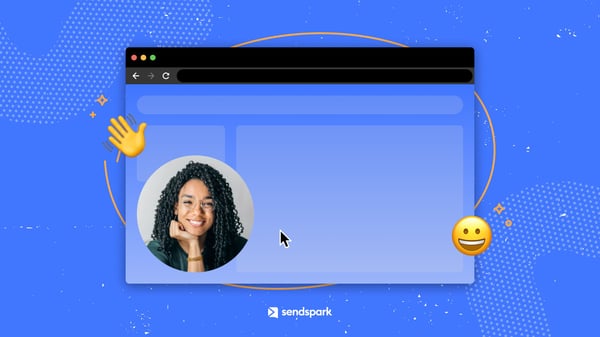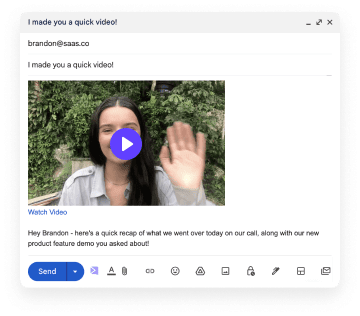It’s 2022! And no doubt you’ve already read that video and personalization are **the** trends to watch in marketing, sales, and comms - right?
And if each one is superpowered on its own, when we start talking about personalization in video…well, we must be talking Infinity Stone-level stuff here!
It makes perfect sense: people love videos. And people love being treated as individuals.
But video personalization can be a two-edged sword. Get it right, and it’s happy days. But get it wrong, and it can be as clunky as hell or even creepy.
In this blog, we’re going to tell why and when you to be using personalization in video; what you need to avoid; and what you need to do to make awesome personalized videos.
Why Use Personalized Video?
There is a huge body of evidence showing that personalization in sales and marketing delivers better results than generic messaging:
- 72% of Americans will **only** respond to personalized marketing messages
- Personalized marketing emails generate 27% higher clickthrough rates and 11% higher open rates than non-personalized messages
- 78% of US internet users say that personalized branded content increases their purchase intent, and 87% say that it positively influences how they feel about brands
- Personalized calls to action have been shown to perform as much as 202% better than traditional CTAs in a Hubspot study of more than 300,000 CTAs
And the stats about the effectiveness of video speak for themselves:
- Video marketing is used by 86% of businesses
- 91% of businesses believe that Covid-19 has increased the importance of video marketing
- Video marketing generates 600 times more return than direct marketing and print put together
- 93% of brands have won new customers via social media video
- 90% of customers say that online video helps them to make purchasing decisions
Finally, while personalized video is newer than either technique on its own, there is still a lot of data showing how it combines the benefits of both:
- Personalized videos are 35% more likely to retain viewers
- One study found that personalized video email campaigns generated 280% higher ROI than standard video email campaigns
- Marketo increased event attendance by 36% by sending personalized video invites
- Personalized videos get 4.5 times more clicks and a 16 times higher click-to-open ratio
So…pretty convincing, huh?
No doubt you’re now champing at the bit to get started with video personalization.
But wait!
There are a few different ways to go about personalizing your video content, and each has its pros and cons. It’s important to understand those before you decide how you’re going to proceed.
3 Types of Personalization in Video
Personalization is the next step onwards from segmentation. Rather than treating individual leads as members of a group or instances of a persona - even really tightly targeted ones - personalization aims to treat them as unique individuals.
Tailored content can be targeted at groups based on shared interests. Personalized content should be too - but it also needs to appeal directly to each individual.
What makes people unique?
Fortunately, we don’t have to solve that particular conundrum at the philosophical level. From the point of view of sales and marketing, it’s individual data regarding job titles, employers, locations, etc - and above all, names.
But how to get that data into your videos?
Essentially, there are three ways.
1. Truly Personalized Videos
A truly personalized video is a video that is creating individually for each recipient.
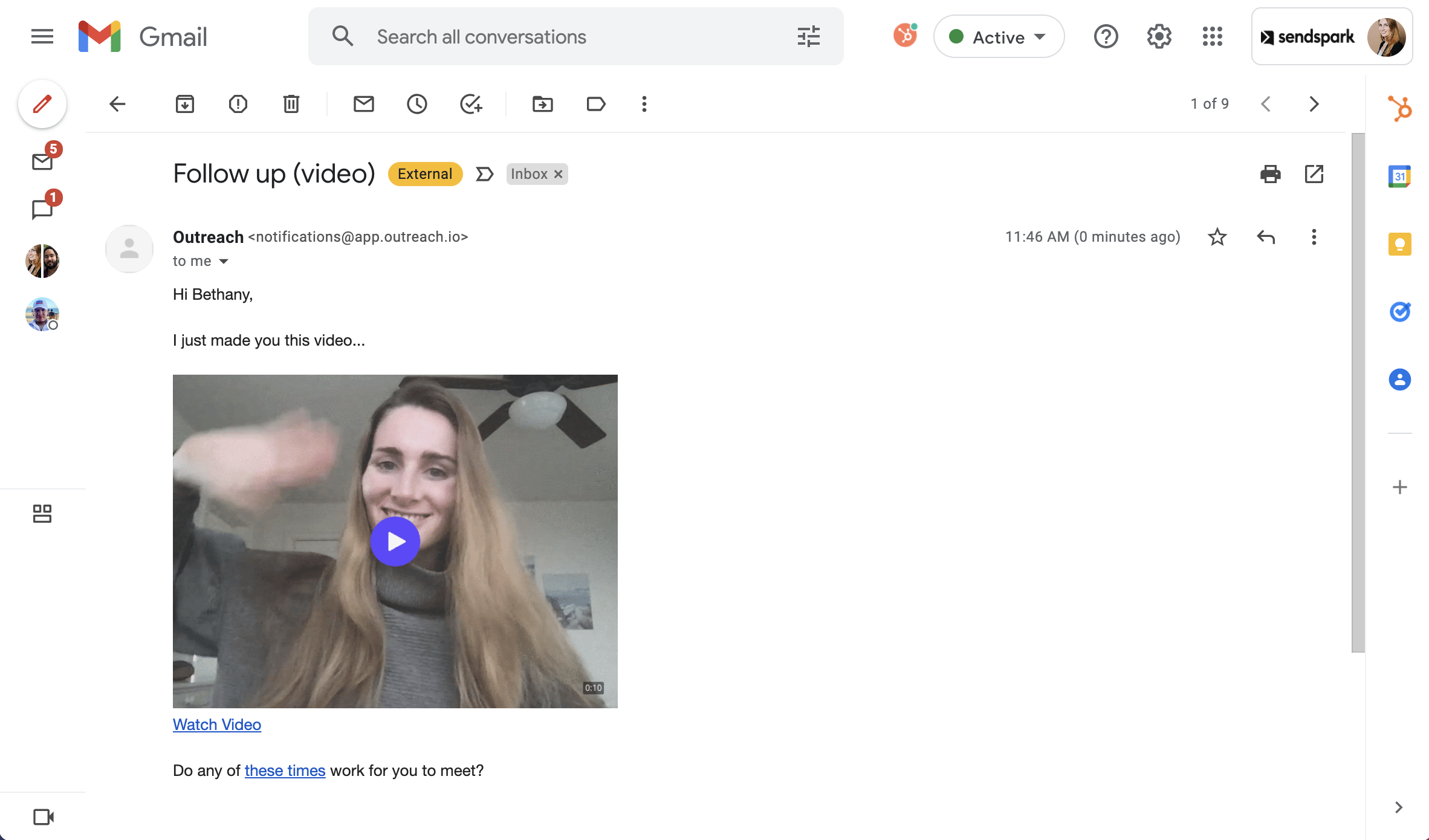 The benefits of truly personalized videos are that they are super personal, and super relevant. They can related to previous conversations, specific questions, or unique information.
The benefits of truly personalized videos are that they are super personal, and super relevant. They can related to previous conversations, specific questions, or unique information.
However, the tradeoff is significant: you can only use a truly personalized video one time, so it is hard to scale.
We recommend using truly personalized videos when you are looking to really move the need. It might be exactly what you need for...
- Following up with a highly qualified lead after a discovery call
- Re-engaging a high priority lead that has recently grown cold
- Sharing information or checking in on your best customers
- Mid and bottom of funnel content
- Experimenting with content
Thankfully, the technology for producing bespoke personalized videos has made this really accessible, really easy to do, and very affordable.
Sendspark is video personalization software that allows you to create videos of this sort - with no time restrictions - for free, simply by installing a Chrome extension. Install it and give it a try yourself now!
Sendspark provides...
- Instant integrations with Gmail, LinkedIn, and tons of other email platforms, so you can record and insert videos right from your email compose window
- Templates to add text or call-to-action buttons to your video with one click
- Cool thumbnail personalization options to ensure that you are going to get the results you're looking for from creating personalized videos.
1. Mass personalized videos
The theory is one most people will be familiar with from email automation. Certain “fields” in the template video are filled with personal data from a list of details held by the business producing the video.
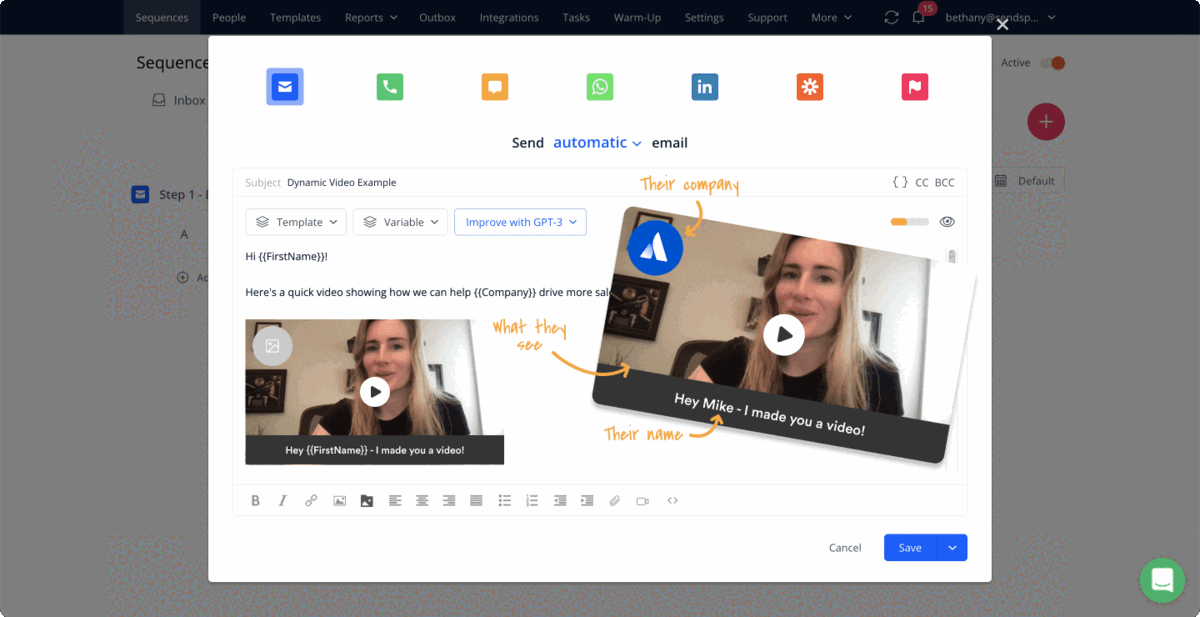
The big benefit of mass personalized videos is scale. You can create one video and use it infinite times, without any limitations.
The tradeoffs is lack of authenticity and lack of relevance. Your messaging has to appeal to an entire segment (not one specific conversation), and it is often obvious that this video is not "truly personalized." Most of us know this hasn’t been created “just for you” but by technology.
Mass personalized videos can still be extremely helpful, you just have to know when to use them.
- Prospecting targeted segments
- Automated customer lifecycle emails (for driving activation and retention)
The trick is using mass personalized videos is not pretending that they are genuinely personalized. If you are deceitful, it will be embarrassing when you are "found out." Just use mass personalized videos for what they are meant for, and enjoy the 30%+ lift in email engagement!
Sendspark is one of the best video personalization software for creating mass personalized videos and sending them in nearly any email marketing platform. Try making a couple mass personalized video emails and enjoying the evergreen lead flow!
3. Hybrid Personalization
With this method, you can record a custom video introduction, and combine it with an existing video. This is a great way to create personalized videos at scale; as you are able to record truly personalized videos, but never repeat yourself.
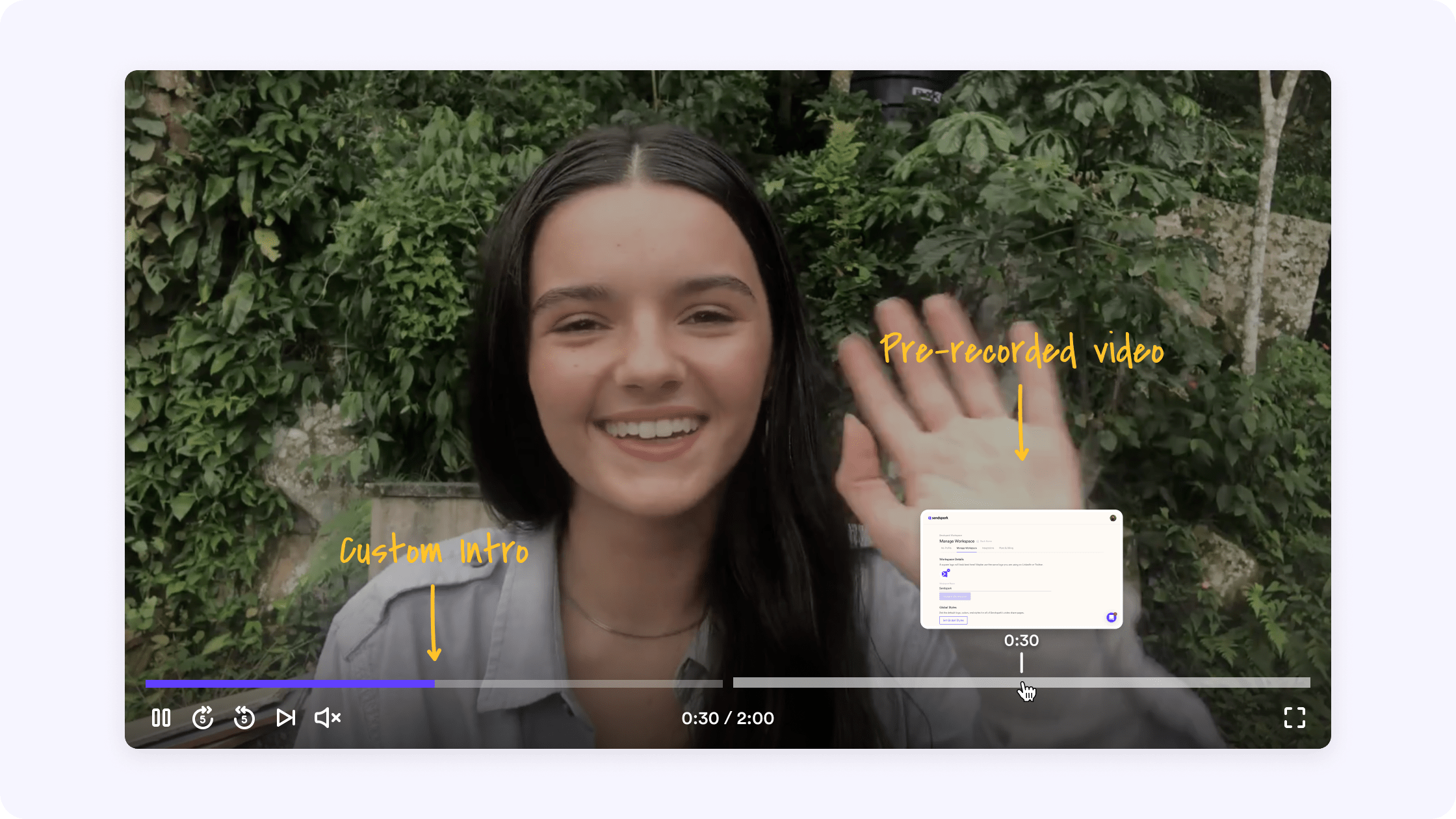 Hybrid personalized videos are great for anytime you need to make highly personalized - yet highly repetitive - content. We recommend this for:
Hybrid personalized videos are great for anytime you need to make highly personalized - yet highly repetitive - content. We recommend this for:
- Personalized sales prospecting
- Creating welcome videos for new customers
- Sending sharing product demos with prospects or customers, with a custom intro
- Share customer testimonials with prospects or customers, with a personalized intro
Again, Sendspark is a great selling tool, and can help you scale yourself with personalized video. Get started free!
3 Things to Avoid in Video Personalization
#1 Don’t be creepy
Showing how much you know about a prospect is not always a good thing! If the level of personalization you cram into your videos is too much, it can make people very uncomfortable about how much data you have on them.
It’s never been easier for web users to withdraw their consent for you to contact them, so until you know somebody well for real - not just from their data - keep your personalization subtle.
#2 Don’t overdo it
“Hi, John! John, do you know this feeling? When somebody keeps using your name over and over again, John? How does that make you feel, John? John…? Are you still there John…?”
It’s a pleasant surprise once or twice. But repeat a personalized line too many times and it quickly becomes irritating, rings false, and can undo the benefit of personalizing in the first place.
#3 Don’t skimp on automated templates
If you’re going down the automated template personalized video route, be prepared to spend serious money.
Vidyard, for example, offers this service from a starting price of $5,000. Of course, there are cheaper options, but you need to balance cost against quality. Badly-made personalized videos can look very clunky indeed.
3 Best Practices for Personalized Video
#1 Think beyond “Hi #Firstname”
This video from BlueBiz keeps appearing in lists of the best personalized videos.
There’s nothing wrong with it - but look at when it was published! October 2013…👴!
In 2022, people will have seen their names in sales and marketing videos plenty of times. It doesn’t have the impact it once had. Avoid creepiness - but be creative!
#2 Pay attention to the whole experience
A great video that nobody watches or that doesn’t lead people to action is a waste of effort.
To get viewers to watch your videos, ensure that the personalization is obvious from the preview image. Sendspark gives you three ways to do this:
- by generating animated GIF previews which play automatically in emails
- by enabling you to superimpose a lead’s company logo on the preview
- by allowing you to put a caption onto the GIF where you can write a personal message
Plus, Sendspark enables you to close the loop - measuring the effectiveness of your videos and driving the next actions:
- By hosting your videos on landing pages that you customize yourself, you can not only control the viewer’s overall experience (not something you can do on YouTube, for example, where other companies’ adverts will play in the pre-roll) but also track opens and views
- By including tailored calls to action on those landing pages right below the video - maximizing the chances of a viewer progressing along the customer journey
Tailor the entire experience through to CTA
#3 Create empathy and connection
Why are face-to-face meetings so effective?
Because so much of communication is non-verbal. It’s conveyed by facial expressions, tone of voice, and body language as much as by the content of what you say.
So as tempting as it may be to personalize an animated video, there is kind of no substitute for somebody friendly speaking directly to the audience through the screen.
Unless it’s delivered with empathy, personalization can seem over-familiar and contrived.
So make sure your presenter is smiling, making eye contact, and moving their hands around (waving in the GIF preview, for example!) to emphasize what they are saying. If you're not comfortable with how you look in front of the camera, try using video filters to feel for confident. Studies have continually shown that these factors all increase trust.
Video’s power to convince comes from creating empathy
Conclusion
Back in 2019, McKinsey claimed that within five years, personalization would be the main driver of marketing success.
In 2020, Cisco predicted that 82% of all internet traffic would be video by 2022.
If all the stats we hit you with earlier in this blog didn’t convince you about personalized video, then surely those two will.
It’s the future, people! And you’ve got a chance to get ahead of the competition by embracing video personalization while it’s still relatively new and rare.
Sign up with Sendspark today, for free, and start creating beautiful, tailored videos within minutes!

